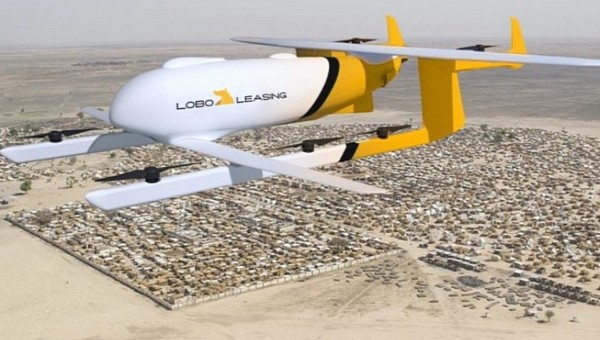Nobody can dispute the tremendous role that unmanned aircraft could play in healthcare and any type of emergency services. If they can provide the same benefits while also aligning with the net-zero carbon goal, all the better.
Smaller drones are already being used in various parts of the world for the fast delivery of medical medicines and even the emergency transport of organs. But that’s just the first step. The use of bigger aircraft with a greater cargo capacity and increased range can become a real game-changer in the larger field of humanitarian operations.
For example, a UAV (unmanned air vehicle) can provide unprecedented 24-hour operational capability, simply because it’s not relying on human operators. For the same reason, plus an adequately rugged design, it can carry out its tasks even in the most challenging environments or weather conditions. This includes the ability to take off and land vertically even in places that don’t have any airport infrastructure.
All-electric aircraft are not yet equipped to handle such operations, with limited range being one of the main issues. This is where hybrid-electric UAVs, like Pipistrel’s Nuuva V300, come in.
This autonomous cargo eVTOL, currently under development at the Slovenia-based company with facilities in both Slovenia and Italy (owned by Textron as of last year), combined the benefits of autonomous cargo deliveries with an increased range.
The C-UAV is capable of vertical take-off and landing thanks to eight battery-powered Pipistrel E-811 electric engines that have already obtained Type Certification. Entirely liquid-cooled, this powertrain claims to be able to withstand potential faults and so-called thermal runway events. It also comes with a self-monitoring system for increased safety.
On the other hand, an internal combustion engine in the aft fuselage ensures the aircraft’s long range of over 300 km (186 miles) with a 300-kg (661 lbs) payload.
Once it takes off, the Nuuva V300 flies 100% autonomously, controlled only by its advanced fly-by-wire system (provided by Honeywell). All throughout the flight, the UAV is monitored by a ground operator, who has the ultimate control in case of unexpected events.
A fleet of 15 Nuuva V300 aircraft will soon kick off humanitarian operations, as part of the fleet of Air Taurus, an Irish company affiliated with AYR, a reputable provider of humanitarian logistics services.
Air Taurus is leasing the Pipistrel hybrid-electric aircraft through Lobo Leasing, and plans to use them for the delivery of essential supplies to areas that have zero or degraded airport infrastructure.
This is part of a wider strategy at Air Taurus, which intends to rely heavily on these next-generation aircraft in the future. It’s not just about reaping the benefits of unmanned alternatives, but also about reducing the emissions associated even with humanitarian missions as much as possible.
For example, a UAV (unmanned air vehicle) can provide unprecedented 24-hour operational capability, simply because it’s not relying on human operators. For the same reason, plus an adequately rugged design, it can carry out its tasks even in the most challenging environments or weather conditions. This includes the ability to take off and land vertically even in places that don’t have any airport infrastructure.
All-electric aircraft are not yet equipped to handle such operations, with limited range being one of the main issues. This is where hybrid-electric UAVs, like Pipistrel’s Nuuva V300, come in.
This autonomous cargo eVTOL, currently under development at the Slovenia-based company with facilities in both Slovenia and Italy (owned by Textron as of last year), combined the benefits of autonomous cargo deliveries with an increased range.
The C-UAV is capable of vertical take-off and landing thanks to eight battery-powered Pipistrel E-811 electric engines that have already obtained Type Certification. Entirely liquid-cooled, this powertrain claims to be able to withstand potential faults and so-called thermal runway events. It also comes with a self-monitoring system for increased safety.
On the other hand, an internal combustion engine in the aft fuselage ensures the aircraft’s long range of over 300 km (186 miles) with a 300-kg (661 lbs) payload.
Once it takes off, the Nuuva V300 flies 100% autonomously, controlled only by its advanced fly-by-wire system (provided by Honeywell). All throughout the flight, the UAV is monitored by a ground operator, who has the ultimate control in case of unexpected events.
A fleet of 15 Nuuva V300 aircraft will soon kick off humanitarian operations, as part of the fleet of Air Taurus, an Irish company affiliated with AYR, a reputable provider of humanitarian logistics services.
Air Taurus is leasing the Pipistrel hybrid-electric aircraft through Lobo Leasing, and plans to use them for the delivery of essential supplies to areas that have zero or degraded airport infrastructure.
This is part of a wider strategy at Air Taurus, which intends to rely heavily on these next-generation aircraft in the future. It’s not just about reaping the benefits of unmanned alternatives, but also about reducing the emissions associated even with humanitarian missions as much as possible.








